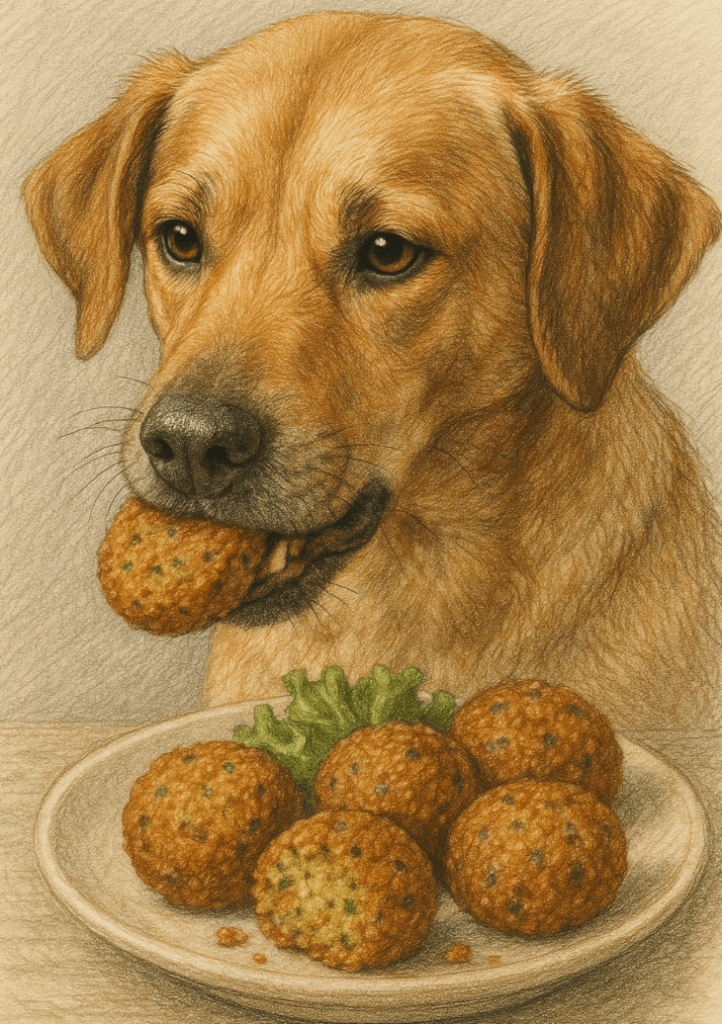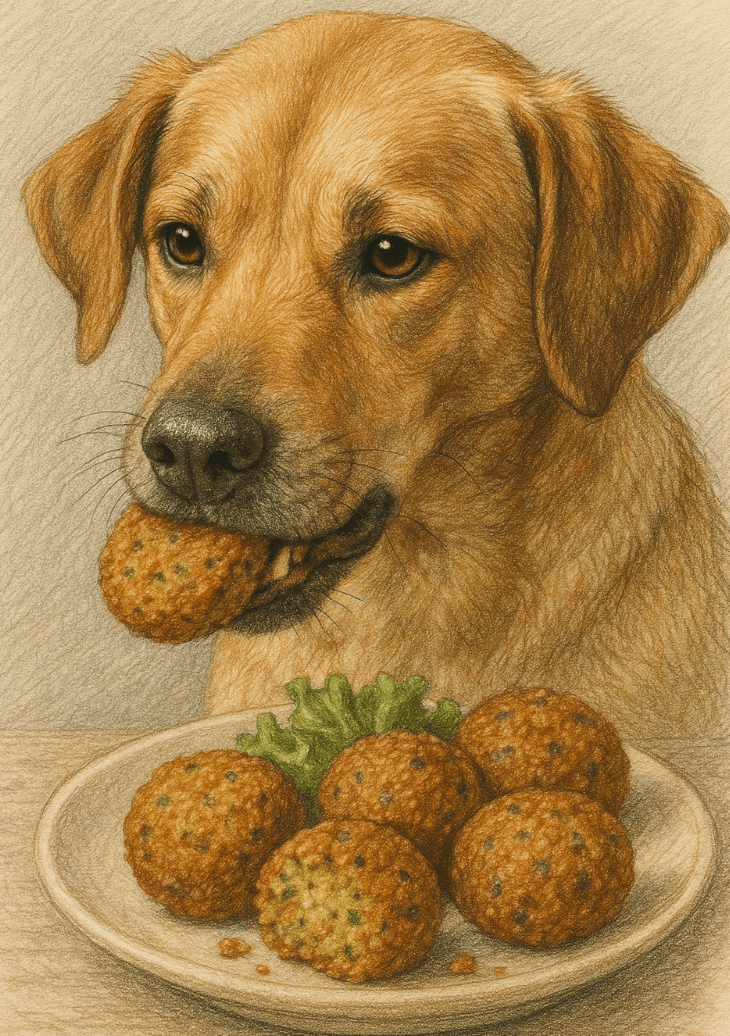Can Dogs Eat Falafel?
Falafel, those delicious deep-fried balls made from ground chickpeas or fava beans, are a popular dish in Middle Eastern cuisine. But can our furry friends enjoy this tasty treat too? While falafel may seem like a healthy snack at first glance—packed with plant-based protein and spices—it’s not necessarily safe for dogs. Understanding the ingredients, potential risks, and safer alternatives is key to keeping your pup happy and healthy. In this blog post, we’ll dive into everything you need to know about feeding falafel to dogs, including what makes it risky and how to share food safely.
Potential Risks of Feeding Falafel to Dogs
While falafel might sound harmless, certain ingredients and preparation methods can pose risks to your dog’s health. Here’s what you need to watch out for before sharing this snack with your pup.
High Fat Content:
Falafel is often deep-fried, which adds unnecessary fat that can upset your dog’s stomach or lead to pancreatitis over time.Spices and Seasonings:
Ingredients like garlic, onion powder, or cumin are toxic to dogs and can cause digestive issues or even damage red blood cells.Salt Levels:
Many falafel recipes include high amounts of salt, which can lead to dehydration, sodium ion poisoning, or kidney problems in dogs.Choking Hazards:
The dense texture of falafel can be difficult for dogs to chew, increasing the risk of choking or gastrointestinal blockages.Allergic Reactions:
Some dogs may have sensitivities to chickpeas or other legumes, leading to symptoms like vomiting, diarrhea, or skin irritation.
These risks highlight why caution is essential when considering sharing falafel with your dog. Always prioritize their safety over curiosity.
Ingredients in Falafel That Are Harmful to Dogs
To determine whether falafel is safe for dogs, it’s important to break down its common ingredients and assess their impact on canine health.
Garlic and Onions:
These flavor enhancers are toxic to dogs, causing oxidative damage to red blood cells and potentially leading to anemia.Spices Like Cumin or Coriander:
While not always toxic, these spices can irritate a dog’s digestive system and should be avoided.Salt:
Excessive salt disrupts electrolyte balance in dogs, leading to symptoms like excessive thirst, lethargy, or seizures in severe cases.Deep-Fried Oil:
The oil used to fry falafel adds unhealthy fats that can trigger pancreatitis or obesity if consumed regularly.Chickpea Flour (in Some Recipes):
While plain chickpeas are generally safe, processed versions may contain additives or allergens harmful to dogs.
Understanding these ingredient risks ensures you make informed decisions about your dog’s diet.
Check this guide 👉Can Dogs Eat Rutabaga? Best 7 Expert Tips!
Check this guide 👉Can Dogs Eat Matcha? Best 7 Expert Tips!
Check this guide 👉Can Dogs Eat Bamboo? Best 7 Expert Tips!

Safe Alternatives to Falafel for Dogs | Risks of Unsafe Ingredients in Falafel |
|---|---|
Plain cooked chickpeas (unsalted) | Garlic and onions causing toxicity |
Steamed vegetables (carrots, zucchini) | Spices irritating the digestive tract |
Lean proteins (chicken, turkey) | High salt levels leading to dehydration |
Homemade baked treats | Deep-fried oils contributing to obesity |
Small pieces of plain bread | Choking hazards from dense textures |
How to Safely Share Falafel with Your Dog (If Necessary)
If you’re determined to let your dog try falafel, there are ways to minimize risks and ensure their safety. Follow these guidelines carefully.
Choose Homemade Over Store-Bought:
Preparing falafel at home allows you to control the ingredients, avoiding harmful spices and excessive salt.Skip the Frying Process:
Bake the falafel instead of frying to reduce fat content and make it easier to digest.Use Dog-Safe Spices:
Stick to mild, dog-friendly seasonings like parsley or turmeric instead of garlic, onion, or cumin.Offer Tiny Portions:
Limit the serving size to a small bite or crumb to prevent digestive upset or choking hazards.Monitor for Adverse Reactions:
Watch for signs of discomfort, such as vomiting, diarrhea, or excessive drooling, after feeding falafel.
By following these precautions, you can occasionally treat your dog without compromising their health.
Signs Your Dog May Have Eaten Something Harmful
Even with careful planning, accidents happen. If your dog consumes falafel containing harmful ingredients, look for these warning signs.
Vomiting or Diarrhea:
These symptoms often indicate gastrointestinal distress caused by toxic ingredients or indigestible components.Lethargy or Weakness:
A sudden lack of energy could signal poisoning or an allergic reaction requiring immediate attention.Excessive Thirst or Urination:
This may result from high salt intake, disrupting your dog’s electrolyte balance.Difficulty Breathing:
Swelling of the face, throat, or tongue can occur due to an allergic reaction to certain spices or additives.Loss of Appetite:
Refusal to eat or drink is a concerning sign that warrants a vet visit.
Recognizing these symptoms early allows you to act quickly and seek veterinary care if needed.
Common Mistakes to Avoid When Feeding Human Food to Dogs
Sharing food with your dog can be tempting, but mistakes can lead to serious health issues. Here are some pitfalls to avoid when introducing human snacks like falafel.
Assuming All Vegetarian Foods Are Safe:
Not all plant-based foods are dog-friendly; many contain hidden toxins or irritants.Ignoring Portion Sizes:
Even safe foods can cause problems if fed in large quantities, leading to obesity or digestive upset.Overlooking Seasonings and Additives:
Spices, oils, and preservatives in human food can harm dogs, even in small amounts.Feeding Fried or Processed Snacks:
Fried foods are high in fat and unhealthy for dogs, regardless of the base ingredients.Skipping Veterinary Advice:
Always consult your vet before introducing new foods to your dog’s diet to avoid surprises.
Avoiding these mistakes ensures your dog stays safe and healthy while enjoying occasional treats.
Healthier Treat Options for Dogs
Instead of risking falafel, consider these nutritious and dog-safe alternatives to reward your pup.
Plain Cooked Chicken:
A lean protein source that’s easy to digest and loved by most dogs.Carrot Sticks:
Low-calorie and crunchy, carrots are a great option for dental health and enrichment.Pumpkin Puree:
Rich in fiber, pumpkin aids digestion and can help with constipation or diarrhea.Blueberries:
Packed with antioxidants, blueberries make a sweet and healthy snack in moderation.Homemade Peanut Butter Treats:
Use xylitol-free peanut butter to bake simple, dog-friendly cookies they’ll adore.
These options provide variety and nutrition without compromising your dog’s health.
Understanding Your Dog’s Dietary Needs
Every dog has unique dietary requirements, and understanding their needs helps you make better food choices.
Age and Size Matter:
Puppies, seniors, and small breeds have different nutritional needs compared to adult or large-breed dogs.Activity Level Influences Diet:
Active dogs require more calories and protein, while sedentary dogs benefit from lower-calorie diets.Allergies and Sensitivities:
Some dogs are allergic to common ingredients like grains, dairy, or certain proteins; identify triggers through elimination diets.Balanced Nutrition Is Key:
Ensure your dog’s meals include a mix of protein, fats, carbohydrates, vitamins, and minerals for optimal health.Consult Your Vet Regularly:
Regular check-ups help track your dog’s weight, health, and dietary needs over time.
By tailoring their diet to their specific needs, you can support your dog’s overall well-being and longevity.
Frequently Asked Questions About Dogs and Falafel
Is plain falafel safe for dogs?
Even plain falafel is risky due to its high-fat content and potential choking hazard. It’s best avoided altogether.
Can dogs eat chickpeas?
Yes, plain, cooked chickpeas are safe in moderation but avoid seasoned or canned varieties.
What happens if my dog eats garlic-laden falafel?
Garlic toxicity can cause symptoms like vomiting, weakness, or jaundice; contact your vet immediately.
Are baked falafels safer than fried ones?
Baked falafels are slightly safer but still risky due to spices and high fiber content.
What should I do if my dog accidentally eats falafel?
Monitor them closely for adverse reactions and consult your vet if symptoms arise.
Prioritizing Your Dog’s Health When It Comes to Human Foods
While falafel might be a tasty treat for humans, it’s not ideal for dogs due to its harmful ingredients and preparation methods. By understanding the risks and opting for safer alternatives, you can keep your furry friend healthy and satisfied. Always prioritize your dog’s well-being over indulging their curiosity about human foods. Remember, a little extra care goes a long way in ensuring your pup stays happy, healthy, and wagging their tail for years to come.
Do Cats Have Taste Buds? Best 7 Expert Tips! – Discover how cats experience flavors and why their taste is so unique.
Do Dogs Have Taste Buds? Best 7 Expert Tips! – Discover how dogs experience taste, their preferences, and what it means for their diet and health.
Can Cats Taste Sweet? Best 7 Expert Tips! – Discover why cats can’t taste sweetness, how it affects their diet, and tips to keep them healthy and happy.
Can Dogs Taste Sweet? Best 7 Expert Tips! – Discover how dogs perceive sweetness, which foods are safe, and tips to manage their sweet cravings responsibly.





